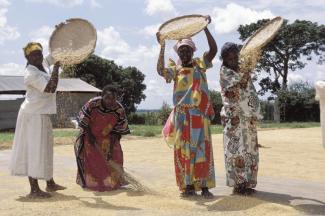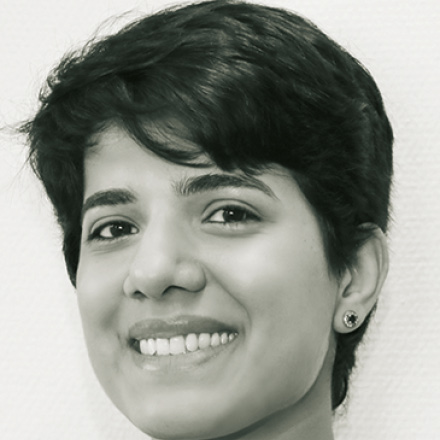Gender
Multiple loss
 Lineair
Lineair
Among the Luo tribe in northern Uganda, a region which is emerging from two decades of civil war, the situation of widows is particularly tough. The in-laws take everything from the widow after her husband’s death. All too often, they doubt even her ability to take proper care of her and her husband’s children. In some communities, land that actually belongs to widows is sold without their consent. All too often, widows accept that fate because they do not know their rights or cannot afford the legal fees to get them enforced.
Esther Abonyo, whose husband was killed by rebels from the Lord’s Resistance Army in 1999, has resorted to renting land after she lost all the plots she once used to farm when her husband was still alive. After his death, Abonyo stayed in a camp for displaced persons before returning to her original home. In the meantime, her in-laws had sold the land in her absence, leaving Abonyo with only a small plot where her house is located.
She now pays 30,000 Ugandan shillings (about $ 9 ) rent per year for one hectare. This is a high price in Uganda, where incomes are low and farm revenues uncertain because of volatile rains. One has to be very considerate about what crops to plant and when to plant them.
Hilda Angulu, a human-rights activist, says that when a man buys land, the title is usually on his name, leaving out his wife. One reason is that some men don’t trust their wives. Another issue is that children claim their father's land. Angulu speaks of “big challenges” which often cannot be handled at the family level. She adds that elders and local chiefs often intervene when confusion and disputes rock a family, and they normally contribute to depriving a widow of her land.
According to customary law, the decisions of the elders are what matters, not the pleas of suffering women. Women do most of the farm work in Uganda, but only 15 % of the land is controlled by them. Losing land is especially hard for women who live with HIV/AIDS. Faustine Amutuhaire is one of them. The mother of four lives in Kashari in Mbarara district in western Uganda. She lost her husband to HIV/AIDS as well as her husband’s land and the household properties such as dining tables, chairs, beddings, kitchenware and wall pictures. “We were in the village burying my husband’s remains when my in-laws sneaked back to town, forced their way into our rented house and carried away everything,” Amutuhaire recounts.
She was left shocked and grieving, with no money to seek legal support. Her husband had not written any will. After nights on cold cement in the empty house, her relatives brought some blankets and cooking utensils. Amutuhaire says: “If I had been working, things would have been different. But I had no job, and the entire savings of my husband were spent on his medication and feeding. I even had no land to till. I knew the landlord could come anytime for his money – which I did not have.” With family support, she moved to a cheaper house and started a tomatoes business along the roadside, gradually increasing the range of products. Today, she can meet her basic needs.
In some cases, widows lose land because they refuse to marry their late husband’s brother. Some traditions in Uganda demand that a widow must choose one of her brothers-in-law to remarry and safeguard the late husband’s land and children. However, this practice is fading out after the government stepped in at the height of the HIV/AIDS epidemic to prevent its spread.
Women in polygamous families suffer twice. Clan elders usually recognise the first wife, but even she is not allowed to independently inherit her late husband’s land. The in-laws appoint a son of the deceased to take care of the land and all properties. The second wife is left with nothing.
Nancy Obita is a politician. According to her, a core problem is that land in the Acholi region in northern Uganda is normally owned by families, and that women and widows are considered external relatives. “That makes it difficult for them to keep tilling the land that they used to use with their husbands.” She adds that traditionally, women are not supposed to own assets even when they have contributed to acquiring them. Making matters worse, women are considered the property of their husband and his clan. This results from the bride-price tradition, which, however, is enshrined in the constitution.
For the sake of gender equality, Obita says that land titles must be held by men and women. Moreover, land laws should protect widows. After marriage, she argues, all properties must be co-owned by husband and wife. Obita calls for legal reforms and public awareness raising.
The problems are not limited to eastern and northern Uganda. Widows in other regions tell similar stories of losing land. Most often, however, the local authorities ignore land cases that women present simply because they are women.
Forty-five year old Anna Wandera from Usuk lost all her land after her husband’s death. “My in-laws told me I was just a woman who gave birth only to girls who cannot inherit any property,” she says. In her misery, Wandera returned to her parents’ home – only to be rejected by her brothers’ wives who accused her of failing to stay in her marital home.
However, not all hope is lost for Ugandan widows. The Uganda Association of Women Lawyers (FIDA) is one of several civil-society organisations that are campaigning for their rights. In northern Uganda, FIDA has embarked on raising awareness among cultural and local leaders as well as among the general public on how best to protect women, children and their land.
Lillian Ajok works for FIDA in the city of Gulu in the Acholi region. She says that the region is currently at peace, but that the war has left many scars. Land conflicts are a lasting problem. “Women and families headed by girl-children are particularly affected by land conflicts,” she explains. “Many of them live in remote villages and cannot easily access legal services, so they end up losing their land.”
In urban areas, she says, women are better informed and have access to legal services. To fill the gap, FIDA is making assistance available. FIDA also offers mediation services and works with local councils. An important way to prevent problems is to write a testament. The practice is not common in Uganda because most people believe that only very sick and dying individuals write their wills. As a result, people die leaving their families and properties unprotected.
It is obvious that Uganda’s efforts to protect widows and their land are far from being successful because of persisting gender inequalities. The good news is that the government plans to amend land laws to protect widows, and that civil-society organisations are supporting that cause.
Gloria Laker Aciro heads the Peace Journalism Foundation of East Africa and lives in Kampala.
glorialaker@gmail.com
Twitter: @GloriaLaker
Link
The Uganda Association of Women Lawyers:
http://www.fidauganda.org/
